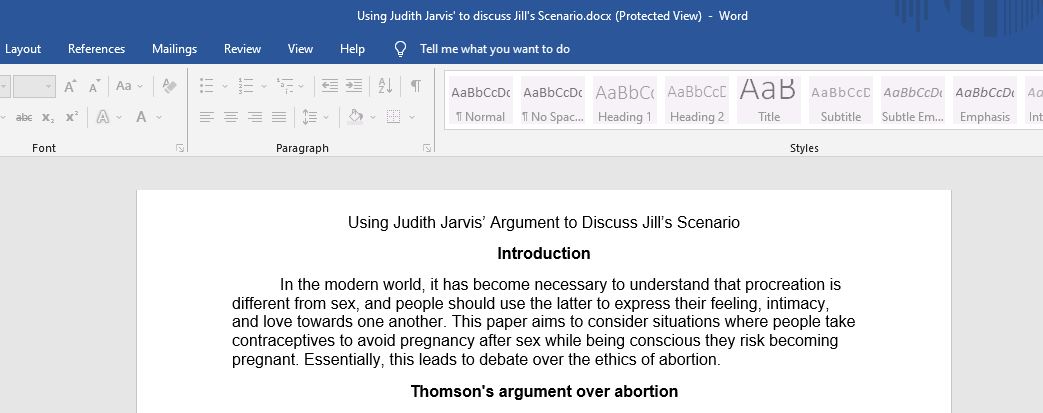Using Judith Jarvis’ Argument to Discuss Jill’s Scenario
ASSIGNMENT DESCRIPTION
Choose one of the following topics and write a single-spaced essay of at least 2000 words. Your introduction and conclusion, if any, should be no more than two sentences each. I discourage you from doing any research beyond extremely careful reading of the assigned texts. The goals of the exercise are 1) to demonstrate a precise understanding of the texts we have studied, and 2) to develop your ability to defend philosophical positions with arguments of your own. You should make extensive use of the texts by citing specific pages and, where appropriate, quoting. Give citations whenever you refer to someone else’s idea. Use any accepted citation format, but use it consistently. If you have any questions, please contact me via email or visit my virtual office hours.
BEWARE: YOU MUST RAISE AND RESPOND TO OBJECTIONS TO YOUR OWN POSITION OR YOUR GRADE WILL SUFFER. SEVERELY LATE PAPERS WILL BE PENALIZED
1. Jill takes birth control pills, using them as directed. She has voluntary sexual intercourse, knowing that she thereby runs a small risk of becoming pregnant, but hoping that she will not. She becomes pregnant. Her fetus is developing normally and poses no significant risk to her life or long-term health, but she wishes to avoid the physical burdens of pregnancy and childbirth, so she has an abortion in the second month. Judith Jarvis Thomson’s position entails that, even if we grant the fetus the same right to life as a newborn baby, Jill has not acted immorally. Explain Thomson’s argument, consider objections, and anticipate Thomson’s replies.
2. Explain what Donald Marquis considers to be the “essence” of the wrongness of killing. Which of our common beliefs does his “future-like-ours” theory capture? Can you formulate a competing theory that captures all of these beliefs? Has he convinced you that it is at least sometimes wrong to kill an unborn baby who presently has no mental states, activities, or experiences?
3. Sam is a proud gay man in his thirties. He and his long-term partner live together and enjoy a good sex life. Bob is another man in his thirties. He and his mother have lived together for years. They share a bed and regularly engage in mutually enjoyable sex acts, including intercourse. They appear to be happy with the arrangement. Bob’s mother is post-menopausal, so there’s no risk of pregnancy. She’s never been married. No one has seen Bob’s biological father since before Bob was born.
Lucinda knows both Sam and Bob. She likes them at first, but when she learns about their sex lives she is disgusted (how she finds out is unimportant). In both cases she concludes that their actions are immoral, and to roughly the same degree. “It’s unnatural for two men to have sex,” she says to herself, “and it’s unnatural for a mother and son to have sex. Sam and Bob are acting wrongly and living bad lives.”
Is Lucinda mistaken in her judgment of Sam? Of Bob? Of both? Of neither? Justify your answers. In doing so, consider the five different senses in which an activity might be considered unnatural, according to John Corvino. Does the unnaturalness of an activity, in any of these senses, constitute a prima facie moral reason to refrain from it?
4. Imagine a dialog with Fritz Allhoff and a critic on the subject of torture in “ticking bomb” cases. Consider both the level of principle and the level of practice.
Formatting: Compose in 12pt, Arial, single spaced and submit in DOCX, DOC, RTF, or PDF.
TEXTBOOK
(EL) The Ethical Life
Ch. 28 Thomson
Ch. 29 Marquis
Other Assigned Readings
John Corvino, “Why Shouldn’t Tommy and Jim Have Sex? A Defense of Homosexuality”
Fritz Alhoff, “Should We Torture in Ticking Time-Bomb Cases?”
Answer preview:

word limit:2080
